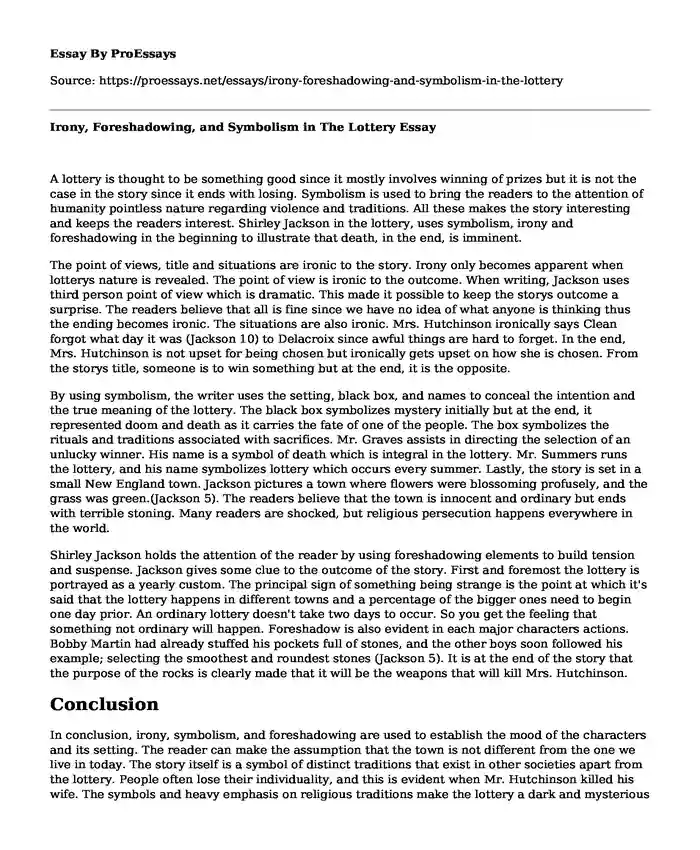A lottery is thought to be something good since it mostly involves winning of prizes but it is not the case in the story since it ends with losing. Symbolism is used to bring the readers to the attention of humanity pointless nature regarding violence and traditions. All these makes the story interesting and keeps the readers interest. Shirley Jackson in the lottery, uses symbolism, irony and foreshadowing in the beginning to illustrate that death, in the end, is imminent.
The point of views, title and situations are ironic to the story. Irony only becomes apparent when lotterys nature is revealed. The point of view is ironic to the outcome. When writing, Jackson uses third person point of view which is dramatic. This made it possible to keep the storys outcome a surprise. The readers believe that all is fine since we have no idea of what anyone is thinking thus the ending becomes ironic. The situations are also ironic. Mrs. Hutchinson ironically says Clean forgot what day it was (Jackson 10) to Delacroix since awful things are hard to forget. In the end, Mrs. Hutchinson is not upset for being chosen but ironically gets upset on how she is chosen. From the storys title, someone is to win something but at the end, it is the opposite.
By using symbolism, the writer uses the setting, black box, and names to conceal the intention and the true meaning of the lottery. The black box symbolizes mystery initially but at the end, it represented doom and death as it carries the fate of one of the people. The box symbolizes the rituals and traditions associated with sacrifices. Mr. Graves assists in directing the selection of an unlucky winner. His name is a symbol of death which is integral in the lottery. Mr. Summers runs the lottery, and his name symbolizes lottery which occurs every summer. Lastly, the story is set in a small New England town. Jackson pictures a town where flowers were blossoming profusely, and the grass was green.(Jackson 5). The readers believe that the town is innocent and ordinary but ends with terrible stoning. Many readers are shocked, but religious persecution happens everywhere in the world.
Shirley Jackson holds the attention of the reader by using foreshadowing elements to build tension and suspense. Jackson gives some clue to the outcome of the story. First and foremost the lottery is portrayed as a yearly custom. The principal sign of something being strange is the point at which it's said that the lottery happens in different towns and a percentage of the bigger ones need to begin one day prior. An ordinary lottery doesn't take two days to occur. So you get the feeling that something not ordinary will happen. Foreshadow is also evident in each major characters actions. Bobby Martin had already stuffed his pockets full of stones, and the other boys soon followed his example; selecting the smoothest and roundest stones (Jackson 5). It is at the end of the story that the purpose of the rocks is clearly made that it will be the weapons that will kill Mrs. Hutchinson.Conclusion
In conclusion, irony, symbolism, and foreshadowing are used to establish the mood of the characters and its setting. The reader can make the assumption that the town is not different from the one we live in today. The story itself is a symbol of distinct traditions that exist in other societies apart from the lottery. People often lose their individuality, and this is evident when Mr. Hutchinson killed his wife. The symbols and heavy emphasis on religious traditions make the lottery a dark and mysterious story.
Works Cited
Cummingsstudyguides.net, "The Lottery: A Study Guides". N.p., 2016. Web. 25 Feb. 2016.
Jackson, Shirley. The Lottery. United States of America: The New Yorker, 1948. Print.
Cite this page
Irony, Foreshadowing, and Symbolism in The Lottery. (2021, Mar 09). Retrieved from https://proessays.net/essays/irony-foreshadowing-and-symbolism-in-the-lottery
If you are the original author of this essay and no longer wish to have it published on the ProEssays website, please click below to request its removal:
- Illustration Essay on the Popularity of the TV Show Young Sheldon
- Literary Analysis Essay on Eve's Diary
- Literary Analysis essay on "Confederates in the Attic" by Tony Horwitz
- Literature Analysis Essay on "Love's Labor's Lost"
- James Baldwin, Hemingway, and Mental Exile in the Metropolis - Research Paper
- Reflective Essay on Ravel's Piano Concerto in G: Orchestra Music, Diverse Instruments, Harmonious Performance
- Essay on MTV: Music, Controversy, and a Legacy of Youth Networking.







